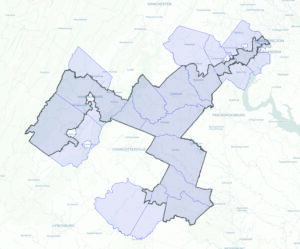A director of George Mason University’s Fuller Institute in its Center for Regional Analysis gave a surprisingly upbeat talk at the monthly luncheon of the Falls Church Chamber of Commerce Tuesday.
Keith Waters, criticized for “doom and gloom” analyses in recent talks around the region, due to the level of Trump administration cutbacks on federal programs in this region, said this time that the Trump administration’s “big beautiful budget bill” has so much added money for national defense, that it will, if anything, charge up the Northern Virginia economy.
He suggested that this factor will prevail against the otherwise terrible effects of mass federal worker layoffs, cancellation of government contracts and ICE raids against a population that provides indispensable support for businesses and services in the region.
In the positive news context of his remarks, he singled out the City of Falls Church for defying the trends almost everywhere else, saying that, along with Prince William County, its government has acted in ways that put it in the forefront of positive economic news.
Asked by the News-Press what, specifically, Falls Church has done to earn such high praise, he identified a “willingness to change to include a diversity of housing types, including multifamily housing,” and an “engagement with the community” on this issue.
He identified the passage of an historic transitional zone amendment as evidence. Now, Falls Church has more people living in multifamily projects than in single family homes. This, he said, has created the basis for other positive developments.
By contrast, neighboring Arlington County and other area jurisdictions are mired in local controversies over the “missing middle” housing, and as a result are also plagued with high vacancy rates in commercial office spaces.
Waters said he puts a lot of weight on available housing stocks for the health of an economy, not so much on affordable housing per se as on the availability of middle income-style housing offering a diversity of options.
A big part of the problem for the region is the fact that it has been underbuilt for the last 15 years, he said.
But the loss of over 30,000 federal and federal contractor jobs in this region, while resulting in a “rocky period ahead,” beyond that the federal budget allocation for defense spending will be “a massive benefit for Falls Church.”
He said the impact of Amazon’s HQ2 development in Pentagon City will be positive, but not critical for this region.
Meanwhile, he said the region is in a period of great uncertainty given the level of federal and federal contractor jobs that have been lost so far this year. Just how bad it all will become won’t be known until November, after the expiration of severance packages for federal employees end on Sept. 30 and the consequences of that showing up for the first time in October numbers.
Keith Waters, Ph.D., is Assistant Director of both the Center for Regional Analysis and the Stephen S. Fuller Institute at George Mason University’s Schar School of Policy and Government. His applied research focuses on critical issues in the Washington, D.C., metro region—particularly labor markets, housing affordability, transportation infrastructure, and regional economic performance
Dr. Waters earned his Ph.D. in Public Policy from GMU, following post-doctoral work at Indiana University and Arizona State University. His academic interests lean toward complexity science and network analysis, reflecting a novel methodological approach to regional economic systems. Prior to GMU, he completed undergraduate studies at Western Michigan University and a master’s degree at UNC Charlotte.
At the Fuller Institute, Dr. Waters has co-authored influential Regional Economic Notes, including partnerships with the Federal Reserve Bank of Richmond, discussing trends like domestic out-migration and economic competitiveness in the region. He also presents findings at major forums, such as the 2023 Annual Economic Outlook Forum, and regularly publishes on topics like population change, household incomes, housing price trends, and infrastructure impacts.
In his dual leadership role, Keith Waters plays a pivotal part in providing data-driven insights to policymakers and community leaders, enhancing understanding of Greater Washington’s evolving economy through rigorous, methodologically innovative research.
Tuesday’s was Waters’ second appearance before the Falls Church Chamber, and latest in the GMU center’s presentations that in the past included those by Dr. Fuller, himself. So far, the projections they have presented have been by and large accurate.













